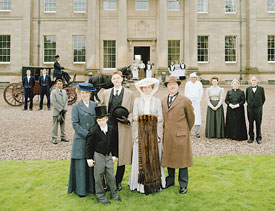July 17, 2006
Bonafide British Person C.J. Quinn Fake British Person Alison Veneto covers the
strange intersections between British television and American television in...
The London Invasion
My life has been full of British lately. I spend most of my driving time listening to the Harry Potter books on tape. I spend most of my mornings watching World Cup soccer (and a lot of my afternoons reading British coverage of World Cup Soccer) and I've even been watching some of the BBC mini-series on DVD while cleaning the house lately. I've been saying things like 'dodgy' and 'brilliant' and even my boyfriend said 'daft' the other day.
And these things are fine examples of America and subsequently Americans picking from Britain what suits them. When it comes to TV (and pop stars and occasionally movies and obviously children's literature), America treats Britain as a buffet — picking and choosing what interests them.
 Yet another British import. |
Fortunately for them, they seem to get all the quality British TV (with Who Wants To Be A Millionaire and The Weakest Link falling to networks for significantly more money). The great detective shows and fantastic mini-series that represent the classiest offerings of the BBC always end up on public television where well too few people will see them.
That being said, let's flash back a few weeks to a night (dark but not stormy) in my very own household. It was before the World Cup because instead of the self imposed insomnia the sport has caused me, there was an unwanted case of sleeplessness. So I reach for the remote and surfed the channels. What I came upon was a show on PBS called Manor House (which evidently in England is called Edwardian Country House).
 |
It became clear quite quickly that this would not be a reality show that the American networks would have any interest in stealing from across the ocean. The participants are only allowed the clothes, technology and living situations commensurate with the era and their stations. They were given primers on how to treat each other and the social and cultural norms of the time. Very quickly, everyone falls in to their roles — giving the viewer a truly unique look at what life was seemingly like.
And it's way more interesting than you might think — from the Master of the House's prejudicial classism to the servant's secret parties to the chef's daily French tirades — there's enough entertainment here for the show to be a pleasure. On the internet, you can find the cult of Kenny the hallboy (who literally must sleep in the hall). Or the butler, Mr. Edgar, whom could be Dr. Who out of the TARDIS, plucked directly from the era. And on top of the entertainment and interesting characters, the show is both educational and makes a point. The combination of which is rather unreal for a reality show.
| His best companion is the unmarried Miss Anson because their situations are not dissimilar. They have conversations about their loneliness all the while noting 'we would not have been allowed to have this conversation...' |
This is a kind of reality TV that would not likely originate amongst the smutty reality TV of the States. Don't get me wrong, Britain actually manages to put out reality TV smuttier than ours at times and they are where we get some of our stupidest ideas for reality shows. But at least it's tempered with these more delightful options (obviously you can watch shows like this on PBS and sometimes on cable, but certainly not on networks). In the US, you're a lot more likely to see a competition to name the worst humanity has to offer than an exploration of the finer themes of anthropology. Yet, to be honest, reality in the US started with these lofty aims. The original Real World was an intelligent snapshot of a generation. But it was also one of the first shows in America to exploit the format (with the help of that notorious hot tub). And due to its educational content and general lack of smut (not to mention lack of cleavage which is concealed beneath layers of Edwardian clothing), Manor House is the exact kind of reality show that the American networks would never want to pick up to remake as they have with so many others shows.
| And while not set in a past era with the comedy of old timey rules and regulations, a look at a rich shopaholic, plastic surgery-ridden housewife, her corporate execute husband and spoiled children contrasting, in the same show, with the lives of their poor immigrant maids and cooks, would probably be a Peabody Award winning anthropological microscoping of the American class divide. |
I suppose this is the advantage of Britain's socialism. The state owned TV stations provide the people with smut to placate them but also feel some obligation towards education. An obligation no one feels in free market America.
This is the third of a series of similar 'house' shows and generally considered to be the best. In a lot of ways it's 'Big Brother' with class. Originally broadcast in England in 2002, it had shown periodically on PBS since 2003 although I didn't notice it until a few weeks ago myself. It's available on DVD.
Email the author.
Return to Season 2, Episode 19.
All written content © 2005 — 2006 by the authors. For more information, contact homer@smrt-tv.com
